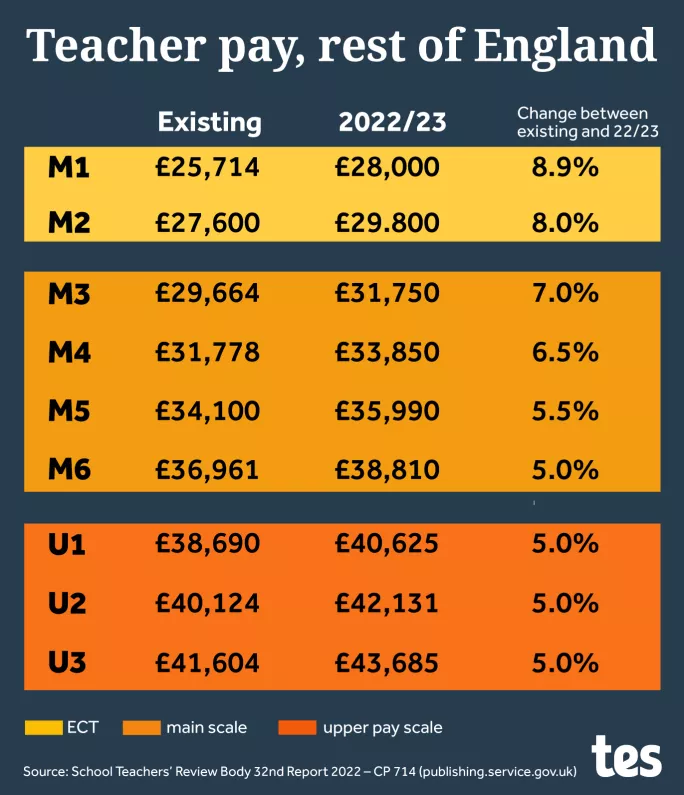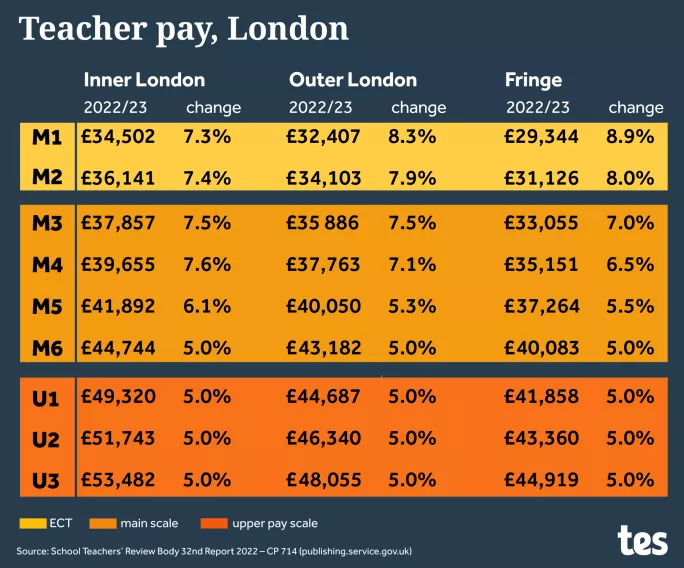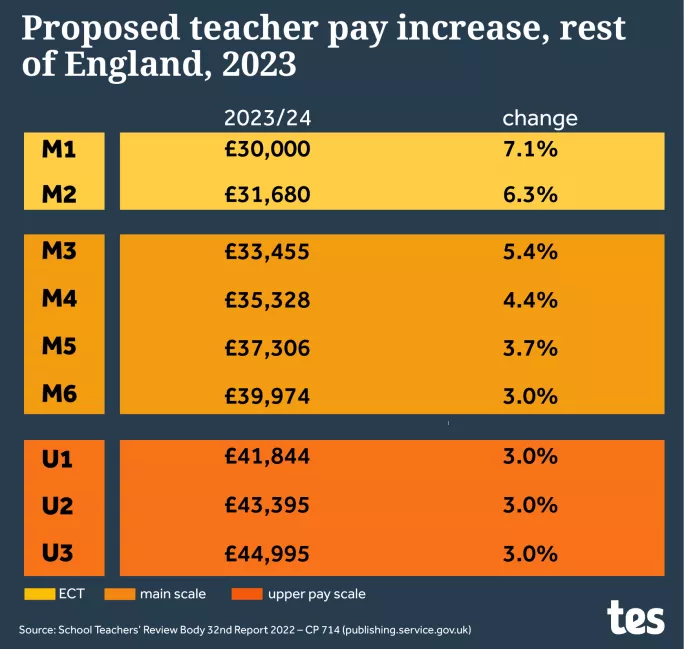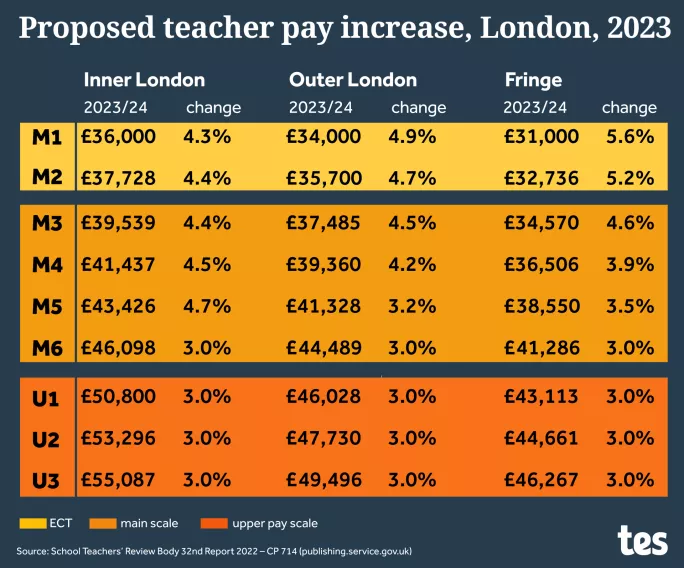
Teacher pay 2022-23: what the salary rises mean for you

The new pay rises have now been updated in the School teachers Pay and Conditions document.
The government has now confirmed the teacher pay increases for 2022-23.
The pay rises vary depending on the experience of the teacher, and the government’s announcement is in line with the recommendations from the School Teachers’ Review Body (STRB).
The pay increases for teachers outside of London range from 8.9 per cent for early career teachers (ECTs) to reach £28,000 in their first year of teaching, to 5 per cent for teachers at the top of the main scale and on the upper pay scale to reach £38,810 and £43,685 respectively.
The table below shows the full breakdown of the pay increases across the various teacher pay scales.

For teachers working in London, the pay scale increase for ECTs in the first year of teaching varies from 8.9 per cent in London Fringe to 7.3 per cent in inner London.
More experienced teachers in London at the top end of the main scale and on the upper pay scale will receive a 5 per cent uplift.
This table below shows how - like in the rest of England - the more years of experience, the smaller the increase to salary.

For teachers in leadership positions, the increases are more uniform.
Lead practitioners will see their pay increase by 5 per cent. Teachers with Teaching and Learning Responsibilities (TLRs) will see a 5 per cent increase in their TLR allowance. Teachers paid on the Leadership Group pay scale will all see a 5 per cent increase in their salaries.
Teacher pay rises: the reasons behind the decisions
The STRB’s report justified its recommendation to award bigger pay rises to less experienced teachers saying that the data showed “graduate joiners to some professions have the potential to earn significantly higher starting salaries than those offered in teaching”.
Retention of newer teachers was also a consideration, with the report noting that “teacher leaving rates were highest among those in their early careers”.
It adds that, when looking at median pay, teachers are below other professional occupations, but that the “gaps are widest for younger teachers and for those in London”.
The problem of the retention and recruitment of new teachers has been raised repeatedly by the sector, and pay has been seen as a key lever with which to try and tackle this issue.
However, Luke Sibieta, a research fellow at the Institute for Fiscal Studies (IFS), said that because the pay rises are “still below inflation”, he believes they won’t be enough to attract the number of people needed into the profession.
“The government has upped its pay offer to teachers, with an average rise of about 5 per cent to 6 per cent in 2022,” he says. “However, this is still below inflation and will make it harder to recruit and retain teachers.”
He also noted that without an increase in funding for schools, the pay rises will be ”just about affordable” within the existing funding settlement - but there won’t be much money left over for everything else schools need to do.
Jack Worth, school workforce lead at the National Foundation for Education Research (NFER), raised a similar concern that pay rises for teachers could have a negative impact on schools in other ways.
“We are disappointed that the government has not provided any new funding to cover the additional pay increase,” he says.
“Underfunded teacher pay rises could have costly impacts, such as staff redundancies and reduced resources for other provision, which will be detrimental to pupils’ learning.”
The threat of strikes
Given all this, it is perhaps no surprise that the government’s pay announcement did not go down well with teaching unions. The NEU, the country’s biggest teacher union, says that although the pay rise of 5 per cent for experienced teachers is an improvement on the proposed 3 per cent increase, “it has not moved far enough”.
Kevin Courtney, joint general secretary of the NEU, said it would “look towards” consulting members about industrial action in the autumn.
“Teachers don’t want to strike - they want to be in the classroom teaching our pupils. But we cannot stand by and watch the biggest real-terms decline in teacher pay this century,” he said.
Geoff Barton, general secretary of the Association of School and College Leaders, said that his union would be speaking to members about “industrial action”. He said that the pay award was the “worst of all worlds” - because it represented a ”substantial real-terms pay cut” for the majority of teachers and schools were not getting any funding to pay for the rises.
“It seems that loyal, hard-working public servants are always expected to take the hit. Unsurprisingly, they have had enough and we - like other unions - will be consulting our members to see whether they wish to take industrial action in response to this decision,” Mr Barton added.
No two-year pay plan
Yesterday’s announcement differs from the original government proposal - in which pay increases were spread across two years.
Writing for Tes, education secretary James Cleverly yesterday said the original plan for teacher pay rises had to be changed because “the world was a different place” now, compared with when the original proposal was put together.
“The simple fact of the matter is that the world was a different place when we made those initial proposals,” Mr Cleverly said. “It’s clear now that it would not be right for us to take those decisions here and now, and, instead, the government will do so in line with the usual process, next year.”
Although not confirmed, the STRB report does include plans for increases in September 2023, saying it “recommend the following levels of pay” - but that they are “subject to a review mechanism”.
From September 2023, the STRB recommends a further uplift to salaries outside of London, from a 7.1 per cent increase for ECTs in their first year of teaching, to a 3 per cent increase for teachers at the top of the main scale and on the upper pay scales.
This would help to ensure that the government hits its promise of moving starting salaries to £30,000 for new teachers.
The full breakdown for proposed increases from 2023 is below.

For teachers in London, meanwhile, the STRB recommends that in September 2023, they also receive uplifts, ranging from 5.6 per cent in the London Fringe for ECTs in their first year of teaching, to 3 per cent for teachers at the top of the main scale and on the upper pay scales.
The full breakdown of proposed increases for London is below.

However, for now these 2023-24 increases remain unconfirmed.
Teachers will be hoping they come to fruition, but for those managing school budgets, facing yet more rises without any additional funding, it may just look like more tough decisions ahead.
You need a Tes subscription to read this article
Subscribe now to read this article and get other subscriber-only content:
- Unlimited access to all Tes magazine content
- Exclusive subscriber-only stories
- Award-winning email newsletters
- Unlimited access to all Tes magazine content
- Exclusive subscriber-only stories
- Award-winning email newsletters
You need a subscription to read this article
Subscribe now to read this article and get other subscriber-only content, including:
- Unlimited access to all Tes magazine content
- Exclusive subscriber-only stories
- Award-winning email newsletters
- Unlimited access to all Tes magazine content
- Exclusive subscriber-only stories
- Award-winning email newsletters
topics in this article



